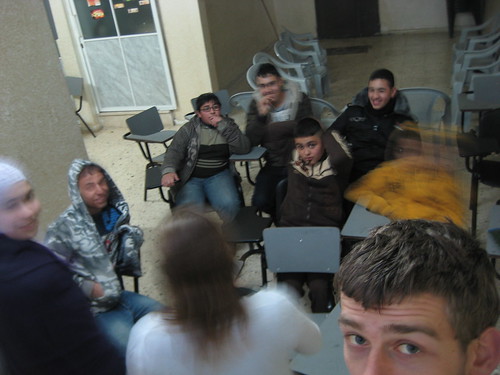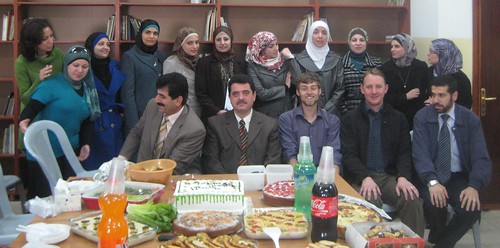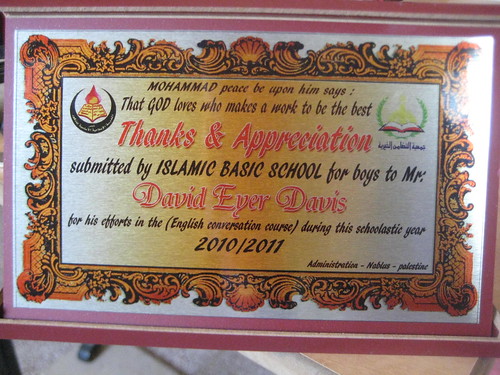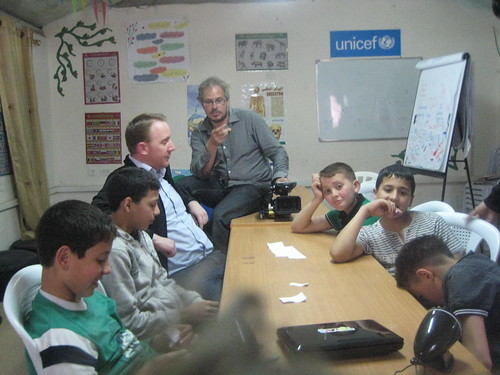
Leaving Project Hope today to parts unknown to the north. Well, I guess they're known, there's nothing particularly mystifying about a name like "Hadad Tourism Village," but still, I'm heading out on my bike with all my worldly possessions beneath me and I must say that sounds rather excellent! The day before I visited my friends in Jeet Village, biking there I felt tense for the first time about my situation as a foreigner on the roads here. I look 100x more like a settler than a Palestinian, and Jeet is surrounded by settlements. I definitely raise some suspicion when I roll up in a conservative village and start asking questions about the nearby geography. Also, more than a few of the settlers have a reputation of international-hassling ("Keep your nose out of my divinely inspired land grab business, you meddling foreigner!") But all turned out well.
Now, nearly 3 months after arriving in Palestine, I thought it time to talk about my teaching experience here. I was hesitant to give reports along the way, as my daily impressions were fluctuating wildly, one week I would be frazzled, ready to give up and the next I would be totally rewarded and invested and generally feeling hopeful for the planet. Looking back, It's hard to keep a handle on all the passed in that time, but like most good things it was incredibly harrowing, rewarding, validating, and made me grow incredibly.
The first month of classes was adjustment. I've mentioned before that as a generally busy person I've never been so busy as I was here, and I think that still holds true for the first half of my teaching position. It was a combination of having SO much to learn, having so many projects and ideas and potential ways to contribute, having a packed schedule, and working with an organization that has about 15 centers to juggle at once and as many volunteers with rotating schedules and varying levels of competence on all sides. Here's an excerpt from 1/21/11:
"Busy, so busy time compresses my head and a day of teaching is an adrenaline rush. Literally back to back meetings, classes, ad-hoc language lessons, sneaking in arabic study and lesson preparation, answering emails, all day, 6 am to 8 pm, go go go. I've never been so busy, which is saying quite a lot. The idea of traditional teaching, once a challenge in and of itself, now seems a cakewalk. How simple to communicate in your own language, in the same place, not everywhere in a city at once as I now am. In 10 minutes I teach a two hour long lesson to ESL college students, a demanding class, their english is good enough to get them in trouble. Then quickly across the entire city by foot and by taxi to Askar camp, where we teach with nothing, trying the wrangle some attention. Then video work, making a blog worth watching, building a critical mass of focus on the country. Justifying the work. Then a presentation, then, maybe, a chance to learn, reflect. Every minute's full."
Some challenges were a result of different priorities and understandings. Project Hope is first and foremost a language center, which is what Palestine needs most and what they're equipped to teach. I didn't want to teach english, but I quickly learned that unless I had some organizational clout behind me and a pretty solid amount of time with each group kids weren't terribly interested in learning about making films. The kids in the refugee camps are balancing a crazy schedule of preparing for exams, taking exams, and resting from exams. I know Islam is a religion of one god, but the fatalism with which people defer things because of rain and examinations makes me wonder if these two subjects don't command the weight and power of animist deities. Just kidding. But the fact of the matter is kids want to run around a be kids and play football and wrestle each other when they're not being subjected to a top-down education.
Things kept changing, changing, changing. My class in Askar started as an English class, an hour long. I shadowed the volunteer before me and witnessed the group of refugee kids devolve into a literally screaming mass before my eyes. The classroom setting was similar to this one:

The next month was spent building trust with them, getting them on board with the idea that if they wanted to learn something fun and creative they'd have to work together to keep the class focused and the disruptive kids in check. We worked on art, photography, and English, and they never screamed or jumped on the desks with me like that first day. Sometimes 13 kids would come, sometimes 4. Then, after a very successful field trip, just as we were starting into film, things fell apart. It took them 45 minutes to do something my other film group had down in 15. I didn't trust them with the cameras, so we took them away. Selma, my co-teacher, said they didn't seem to be getting anything out of the film classes, and we might as well switch to English, and I agreed. When I told the kids that our attempts to do something fun and different had failed, and we would learn English from now on, they didn't flinch for a second. A boisterous, obnoxious girl who suddenly appeared a few times ago simply said she wanted to do English anyway. I told her that I knew she wouldn't behave or pay attention, I'd seen her previous behavior, she shrugged and said she'd be better next time, which is what she always said. The next time we went there were only 2 students there, and we decided to call it off.
In the meantime I was teaching English classes at every level of competence and working on independent film tutoring and projects. I was losing faith in the idea that cameras could be used for anything more than visual aids in learning other subjects, but at the same time I'd hear or learn about other projects that sounded wildly professional and successful, Cinema Jenin or Tomorrow's Youth Organization. It was frustrating. Then I had the opportunity to teach a 6 class film course at the Happy Childhood Center in Balata. It wasn't ideal, as cramming as much material as possible into a 2 week course wouldn't give the students the autonomy and self-empowerment needed to keep their projects up after I left. But it was better than nothing, so I went into it full force. It turned out great. Of the group of 10-12 kids 3 boys and one girl were really keen on the film projects, and two of the boys have wanted to continue working together. We filmed around the camp in a number of fun exercises and made a few good first videos. Monsour and Nayef were the most motivated, they made the contact and scheduled this interview about a house that was demolished by Israeli soldiers:
Then they made this little piece on the day a prisoner was released and talked to him:
The girls took pictures and made a sildeshow of the difficulties children face in the camp, especially girls. We talked a lot about the challenges they had even finding girls to film because all of the spaces in the street are for boys:
The more involved I was in film, the less I sweated the details in the English classes, but they turned out pretty well as well, as I was getting more comfortable with my students, the material, and teaching in general. I tried to keep things focused on discussion and grammar, as the students here are generally quite advanced in terms of vocabulary but never speak or speak timidly, so we did a lot of confidence building stuff. Those classes got to the point that I was well liked and respected by my students and they even threw me a big party with the director of education and an amazing plaque at the Islamic school, which was more than a little absurd.



Toward the end of things I felt a really good balance between my film interest and my ability to be useful as an English first language speaker. There are some things that shouldn't be taught through translation, like editing, blogging, and computer skills. But at other times kids took the film stuff and ran with it, last week concluded another Balata 3 week course that went great in every respect, the kids doing photo scavenger hunts, writing scripts, and producing scenes even though we only had a short time together.

They got to see how to take their videos and put them on youtube and after I added them as my friend on facebook they got excited about the idea of showing me their future creations. Here's their first little scene, about neighbors who are so cramped they start to argue when one accidentally throws trash out his window at the others:
On the documentary front we made a little scene illustrating the inadequate spaces kids have to play. They got one of their friends who is a good as soccer to play in a narrow alley, and the narration talks about the challenges they face in the refugee camp. Then we decided to fool around and film some soccer commentary, which turned out pretty great:
Now that I'm done, part of me feels totally comfortable with this, with the fluctuating attendance, missed translations, and faulty equipment. Towards the end if I showed up to a class and my co-teacher couldn't come I'd just plow on through in crappy Arabic and teach the courses by myself, and they'd turn out great. But when I think about what I want to do next here, and people say, 'oh there's a job opportunity teaching English in X organization', I say, "Hell no!" Looking back on these three months I realize what an invaluable opportunity it's been to volunteer with Project Hope. It gave me a perspective into the way Palestine really works culturally, politically, and logistically, and did so in a way that is locally empowering and locally led, which is really important to consider if your contribution is to be useful.
Saturday, April 16, 2011
Nablus: End of Teaching with Project Hope
Subscribe to:
Post Comments (Atom)



























2 comments:
Hi Davey - We were so impressed with your travels; what a priceless time for you. As a "life-long" teacher, I appreciated your frustrations and joys. The good teachers, of course, learn much more than they teach. Stay safe. Love, Dianne
Hi Soulmate. I'm real impressed with your world do's seriously charging on with my do's. Thanks for keeping our wanderings and legacy moving. G.Dad
I love seeing the films and the slideshow. It is great to hear about your teaching experience, the ups and downs, the process of it all.
I love you, and I am excited for your next journey.
Post a Comment